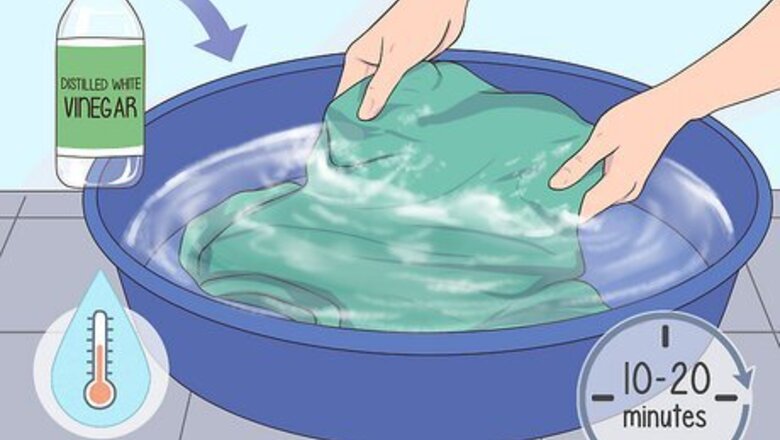
views
X
Research source
Thankfully, odor-absorbing materials like vinegar can help remove the mothball smell from your clothes and living space. We’ll show you how to treat fabrics for mothball smells (with and without washing), eliminate odors from rooms, closets, and your hands, as well as the best ways to store fabrics without mothballs.
Treating Clothing and Furniture Directly
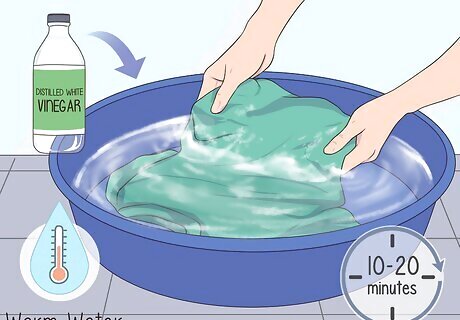
Soak washable clothing in a white vinegar solution. Mix a solution of equal parts warm water and white vinegar in a large bowl. Submerge the clothing in the mixture for 10-20 minutes, then launder it as normal to rinse out the vinegar. Or, launder the clothing in a machine on a regular cycle, substituting an equal amount of vinegar for your regular detergent. Always read the care label on an item of clothing to help you decide whether to hand wash the clothing or wash it in a machine. Hang the clothes somewhere well-ventilated to dry, like near an open window or running fan, for 4-5 hours. Avoid placing the clothes in the dryer. Applying heat to your clothes before the mothball smell is gone may set the odor permanently into your clothes.

Treat non-washable clothing or furniture with vinegar spray. For clothes or furniture that can’t be laundered normally, mix equal parts warm water and vinegar in a spray bottle, then spritz them down with the solution. Hang the clothing somewhere well-ventilated, like near an open window, for 4-5 hours to dry and air out. Or, bring your clothes to a dry cleaner to be treated. Dry cleaners have access to more specialized cleaning solutions that can tackle mothball smell.
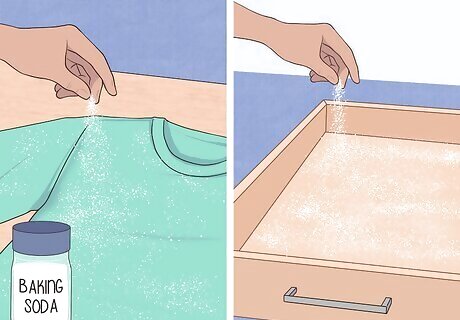
Sprinkle baking soda over smelly clothing or furniture. Baking soda is a powerful spot treatment for most any kind of odor. Lay your clothes out flat, then sprinkle them (or your furniture) liberally with baking soda. Leave them for 5-6 hours, then shake out the baking soda outdoors, or vacuum it off your upholstery. You may need multiple rounds of this before the odor dissipates, so give your clothing or furniture a sniff after removing the baking soda, and repeat as needed.

Place the clothing in the dryer on an air-only cycle. This helps to run air through your clothing, which is then absorbed by the dryer filter, but it may take several cycles on an air-only or “fluff” setting. Crucially, do not use any heat, since heat can set the odor into your clothes permanently. If you’re unsure if your dryer uses heat on these settings, it’s best to skip this step.
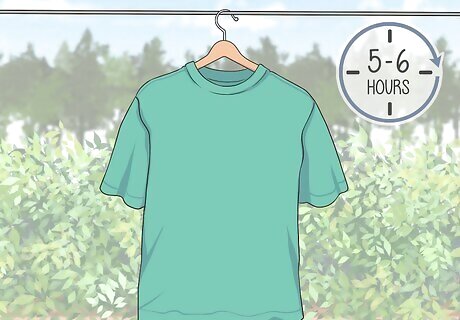
Leave the clothing in the sun to bleach. Sunlight, or UV light, naturally “bleaches” clothing and removes odors, leaving fabrics with that pleasant, laundry-line smell. If possible, leave your clothes or furniture in direct sunlight, like placed near a window, or hang your clothing outside on a line, for 5-6 hours, or until the odor dissipates. Sunlight may also fade colored fabrics over time, so this is best done with light fabrics. Or, turn the clothing inside-out before laying it in the sun.
Removing Mothball Odors from Closets and Rooms
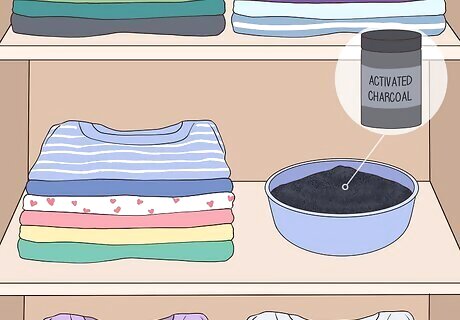
Place activated charcoal near clothing to absorb odors. Activated charcoal is an excellent odor absorber, and can absorb that mothball smell off of clothes and the air around it. Simply leave a small bowl of activated charcoal in an enclosed room with your clothing. Check back every few days, and leave the bowl out for as long as it takes to banish the odor (this may take several days to a couple weeks).

Leave bowls of vinegar in closets and rooms. Like activated charcoal, white vinegar also makes a great odor absorber. If a mothball smell remains in a room, or if clothing cannot be washed, place a bowl of vinegar in the room, near where the odor is strongest. Leave it for several days, or until the odor dissipated. If you don't have white vinegar, use a bowl of coffee grounds or lemon juice, instead.
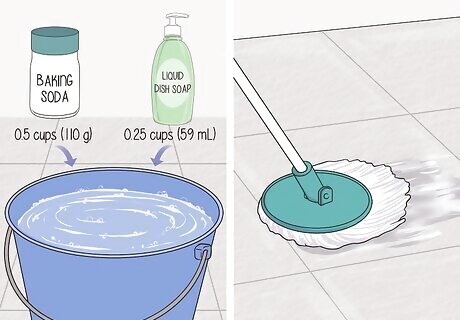
Treat floors with baking soda. For hardwood or tile floors, fill a bucket with warm water and add about 0.5 cups (110 g) of baking soda and 0.25 cups (59 mL) of dish soap, then stir it with a mop. Mop the entire floor with the mixture, making sure the mop is only just damp so that water doesn’t pool, and let it air-dry. Repeat until the mothball smell is gone. For carpets, sprinkle a generous amount of baking soda over the entire area and let it sit overnight. Then, thoroughly vacuum up the baking soda, and repeat the process as necessary.

Get some natural airflow through the space to ventilate it. A cool breeze from outdoors can help naturally whisk mothball smell from both rooms and clothing. For clothing stored in a place like an attic, open any windows on a breezy night. Remove your clothing from any closed storage containers, like boxes or trunks, and hang them up or spread them out. Just be sure to keep an eye on the forecast, and close any windows in the event of rain, snow, or strong winds.
Removing Mothball Odors from Your Hands
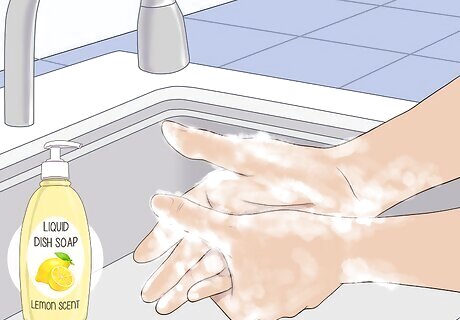
Wash your hands with lemon-scented dish detergent. Dish soap is tougher on smells than hand soap, and safe for skin in small amounts. To get the mothball odor out of your hands, use a lemon-scented dish detergent, which has a strong odor that’ll mask the mothballs, to wash your hands thoroughly after handling mothballs. For very strong mothball smells, sprinkle baby powder on your hands after washing them and rub it into your skin. This helps further remove mothball odor.
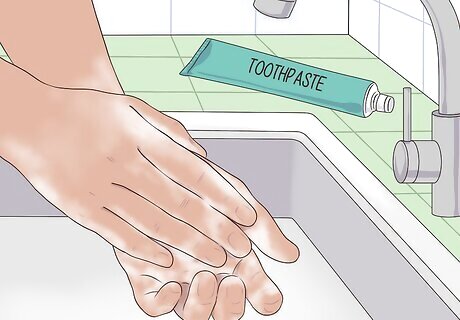
Wash your hands with a dab of toothpaste. Take advantage of toothpaste’s odor-fighting properties for your skin! Rub a peas-sized amount of non-gel toothpaste into your hands and wash your hands with it the same way you use hand soap, for about 2 minutes, then thoroughly rinse it off. Avoid washing with toothpaste if you have sensitive, irritated, or dry skin.
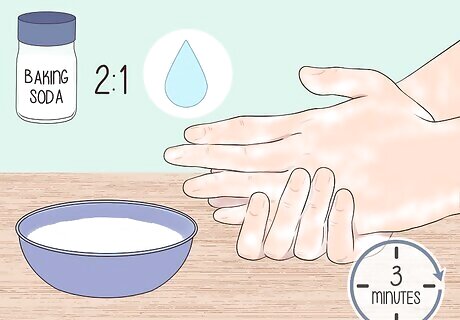
Wash your hands with a baking soda paste. Baking soda is excellent at absorbing and removing unwanted odors. To remove mothball smell with baking soda, mix 2 parts of baking soda and 1 part of water together in a bowl until you have a fine paste. Then, rub the paste into your hands and let it sit for 3 minutes before rinsing it off.
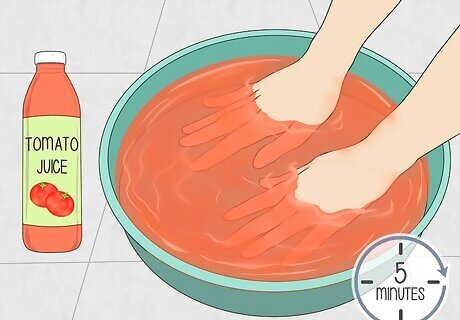
Soak your hands in tomato juice. Tomato juice can effectively mask many unwanted smells and odors. To use tomato juice, fill a bowl with tomato juice. Soak your hands in the tomato juice for 5 minutes before rinsing them off. Note that tomato juice doesn’t actually eliminate odors, only covers them. This may help mask your problem until it goes away naturally, but won’t solve it on its own. Similarly, you might mask the smell with citrus by rubbing the inside of an orange or lemon peel across your skin, or rinsing your hands with orange or lemon juice.
Keeping Your Clothes Odor-Free

Wash and dry clothes before storing them. To avoid mothball smell in the future, store your clothing without mothballs altogether. To do this, wash your clothing and dry it prior to storage to help repel moths by removing odors that attract them.
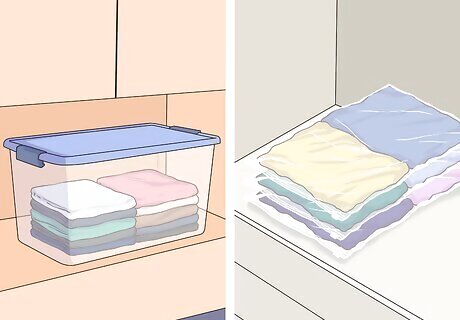
Store clothes in sealed containers. Instead of using mothballs, store your clothing in sealed containers, like lidded storage bins or vacuum-sealed bags, which prevent moths by physically deterring them. If your clothes are sealed away, moths can’t get to them in the first place.

Use cedar chips instead of mothballs to protect your clothes. Place mesh or cloth bags of cedar chips in drawers, dressers, or closets with clothing to repel moths without an aggressive odor. Plus, cedar chips can also absorb the smell of mothballs themselves, making this an ideal alternative. Storing fabrics in cedar chests is also a traditional and effective way to deter moths.

Use other natural repellents instead of mothballs. Store your clothing with bowls of natural repellents. Herbs like rosemary, cinnamon sticks, eucalyptus leaves make great natural repellents and do not leave behind as strong of a smell. You might also use plants like wormwood and peppercorns. Other alternatives include sachets of lavender or spritzes of lavender oil, cloves, or mint.




















Comments
0 comment